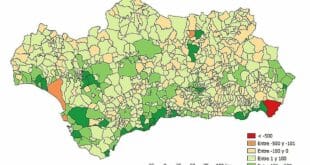The crackdown on Airbnb in Spain has officially started, following a directive issued by government officials in July ordering the removal of any unregistered vacation rentals.
The American rental giant is going to start identifying “irregular listings” and will give hosts a 10 day window in which they can add the Unique Rental Registry Number or the NRUA in Spanish – failure to comply will result in removal.
All properties with a revoked code of registration will be removed in 48 hours.
The new law on short-term rentals in Spain came into force on July 1, 2025. It was a result of a crackdown against the estimated 65,000 Airbnb holiday rental properties that were operating outside of the regulations.
Airbnb will start sending information monthly to the Ministry of Housing in August 2025. This includes state and regional registration number [of listings]” statement The Spanish Ministry of Housing has said.
“The goal of the campaign is to eliminate fraud in holiday or tourist rentals which conflicts with the right of citizens to decent housing.”
Already received: 255.172 applications
Since the Royal Decree 1312/2024 was approved in Spain in early January, holiday rental owners have been informed of the measures.
The government gave a grace period of six months before the 1st July enforcement date.
On 7th July, the Spanish Ministry of Housing received a total of 255,172 applications for registration on the new holiday rentals list – this is possible online via the One-Stop Shop portal, or Ventanilla Única Digital de Arrendamientos.
All short-term holiday rental, including tourist, seasonal, and room-based rentals, are regulated. All online rental platforms such as Airbnb Booking.com Vrbo and others are subject to the same rules.
Airbnb is adding a second field in its registration forms, which will require hosts include both their regional registration number and their new national registration number.
According to the Ministry of Housing, 83% of all applications are for property in five Spanish regions: Andalusia (including Balearic Islands), Canary Islands (including Catalonia), Catalonia, and Valencian Community.
The registrars predict that the number of applications received will soon match the 381,837 estimated tourist rentals in Spain by the National Institute of Statistics (INE).
Spain is the first EU country to enforce EU regulations
The announcement comes at a time when Spain has accelerated the adoption of Regulation EU2024/1028 which established a timeline by which EU countries would begin crackingdown on holiday rental fraud as early as 2026.
Spain is the first EU country to implement the guidelines.
Booking.com already has a large number of customers. removed 4,093 holiday rentals After detecting “illicit listings” on its platform. The removals were for properties based in Asturias, Cantabria, Castilla y León, Navarra, La Rioja and Castilla-La Mancha.
In May, Spain’s Ministry of Housing ordered Airbnb to immediately take down 5,800 listings from a total of 65,935 considered to be in breach of new regulations – these were listings without a registration number, properties that did not specify if the owner was a private individual or a company, or where registration numbers did not match official registers.
Airbnb has had its appeal denied in June. This means that the order remains.
Complaints on the rollout
Airbnb has been enforcing its rules for just two weeks. Already, there are complaints.
According to Joaquín Gómez-Villares, a property law specialist, hosts are seeing “uneven decisions” across different regions in Spain.
He told us that “we’ve seen instances where a certain office would accept a request and another office would reject it, even though the documents were identical.” Idealista.
“The idea was commendable. But give us a uniform system,” he said.
Spanish autonomous communities, such as Andalusia (Spain), the Canary Islands (Canary Islands) and the Valencian Community, have also challenged the legality the national registry. They say that most short-term rental properties already have a regional tourism licence.
“This new measure just layers additional complexity on top of existing structures,” says Gómez-Villares. The red tape is overwhelming.
Gómez-Villares argued that tourist apartments make up less than 4% of the national housing stock, suggesting that the root of Spain’s housing crisis is not with holiday rentals.
Click here for more Spain News by The Olive Press.
 Costa News Spain Breaking News | English News in Spain.
Costa News Spain Breaking News | English News in Spain.







